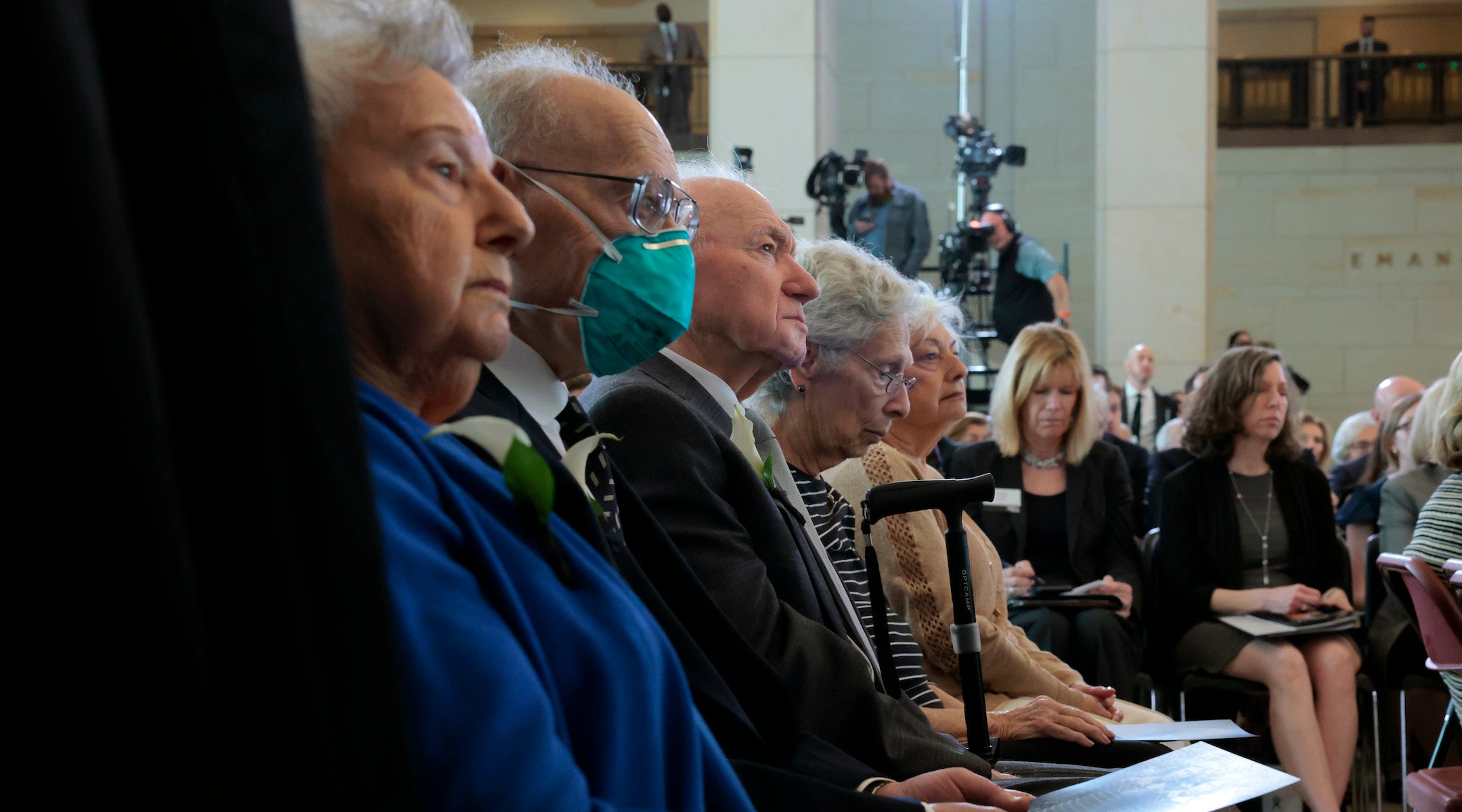A 100-year-old Holocaust survivor in Skokie, Illinois received a surprising notice last year from the Social Security Administration: The government was demanding a refund.
The survivor, who is on a program for low-income seniors called Supplemental Security Income, was told she had been making too much money to continue to qualify. As a result, the letter said, her Social Security payments — her only source of income — would be garnished going forward.
A case worker from a local Jewish organization alerted the woman, who recently moved to the United States from Ukraine and speaks no English, to the problem.
The caseworker also understood immediately what was happening: The supposed extra money that made the survivor ineligible for SSI came in the form of restitution payments for victims of Nazi persecution — which legally cannot be counted as income. An effort to fix the problem immediately began.
“They’ve been withholding money to her,” said her attorney Stacey Dembo, who took on the survivor’s case pro bono through the Skokie-based Council for Jewish Elderly and the Jewish United Fund of Chicago. “I feel a lot of time pressure because of her age.”
The story of this survivor, whom JTA is not naming at the request of her counsel, offers a peek at a troubling pattern that has persisted for decades: low-income Holocaust survivors being denied Social Security payments owing to a specific bureaucratic error that affects only them.
The problems have historically been resolved by persistence on the part of their attorneys. But Dembo said the Trump administration’s gutting of the Social Security Administration has made it harder for her to achieve redress for Holocaust survivors. Under the Department of Government Efficiency, the Social Security Administration expects to cut about 12% of its workforce — around 7,000 jobs — and shutter dozens of its field offices, even as the agency has instituted new rules requiring recipients to visit the offices in person to resolve disputes.
“It’s clear they just don’t understand. They don’t care to understand,” Dembo said. In the past, she said, she could just “send a letter and fix the problem.” But now, with so many personnel cuts at the department, “you’re kind of screaming into the void.”
The Social Security Administration did not respond to questions sent to its press office for this story.
The problem is rooted in the historic catastrophe visited upon European Jews — and the historic reparations negotiated on survivors’ behalf.
After the Holocaust, the Conference for Material Claims Against Germany, known as the Claims Conference, and other groups pursued compensation for the relatively small number of Jews who survived the Nazis’ campaign of extinction. Each year since 1952, the conference has negotiated a pot of funds to support survivors and, increasingly, Holocaust education. Last year, the tally was $1.5 billion.
The Claims Conference says there were about 34,000 Holocaust survivors living in the United States last year — of whom, according to the nonprofit Blue Card, a third live in poverty. As with all Americans whose income is below a certain threshold, these survivors are entitled to SSI, a form of Social Security reserved for low-income and disabled adults.

West German Chancellor Konrad Adenauer signing the agreement that would provide individual compensation to Holocaust survivors through what became the Claims Conference, Luxembourg, September 1952. (Courtesy Claims Conference )
The payments from Holocaust reparations groups can sometimes on paper push these survivors’ incomes just above the monthly SSI limit.
In 1994 Congress passed the Victims of Nazi Persecution Act, stating that such reparations payments can’t count as income or assets for SSI purposes. Yet every so often, owing to human error, ignorance of the law or miscommunication stemming from language and cognitive barriers, a survivor is still mistakenly noted in the system as having been “overpaid” because of their reparations, creating what’s known as an “over-resourcing” error.
This can lead to the Social Security Administration garnishing a survivor’s benefits, sometimes for months — and even demanding repayment from the survivor, effectively treating the mistake as fraud. This verdict, in turn, can result in low-income survivors losing crucial access to Medicaid in the final years of their life.
Such mistakes can be time-consuming to correct, often involving months of legal wrangling on the part of the survivor or, more likely, their attorney. Jewish organizations often provide pro bono legal help for such cases, removing the cost barrier for the survivor. But for survivors in their nineties or older, with no additional source of income, time is still a luxury they can’t afford.
The exact number of affected survivors is difficult to ascertain. “My guess is that we’re dealing with a small percentage,” said Avram Sacks, a Social Security attorney based in Skokie who has helped several survivors appeal such cases. “But even one is one too many.”
Cases can often be “cyclical,” according to Kate Lang, a director at the legal nonprofit Justice in Aging who focuses on SSI recipients. Every few years, Lang says, she’ll hear of new survivor over-resourcing errors — tied to a new round of Claims Conference reparations payments. There’s a bitter irony to this for her.
“Sadly, they’re like, ‘Here we are. We’re coming to help people. We’re going to send them some money,’” Lang said of the Claims Conference. “And then that has this ripple effect of causing problems for SSI recipients in this country.”
Bet Tzedek, a Los Angeles-based legal aid group with a focus on Jewish issues, whose recent charity gala was headlined by former second gentleman Doug Emhoff, has dealt with so many clients of this sort that the group published a guide for Claims Conference recipients on how to keep their SSI benefits.
Bet Tzedek’s guide underscores what advocates say is one of the most troubling aspects of the situation: that the onus is on the survivors to prove their Holocaust payments are not fraudulent.
“It is important to tell Social Security about your Holocaust compensation payments,” Bet Tzedek instructs survivors. “Otherwise, they will not know that the payments are based on your status as a victim of Nazi persecution, and your SSI benefits could be erroneously reduced or terminated.”

Interior of the Harold Washington Social Security Center, Chicago, Illinois. (Wikimedia Commons)
To Sacks and other attorneys who monitor this space, the fact that survivors keep getting trapped in over-resourcing errors is inexcusable given that the benefits agency has been specifically instructed to catch them. When Sacks attempts to resolve such cases, he said, sometimes the Social Security staffer he interacts with — who, in an appeals environment, is there to provide a detailed expertise of benefits law — isn’t even aware of the law. He occasionally breaks through an impasse by threatening to take his cases to the media.
“I didn’t know if I was dealing with a clerk in the back room who was actually knowledgeable and choosing to ignore the law because she doesn’t like Jews, or if she was choosing to ignore the law because she didn’t understand it,” Sacks recalled, of one case out of Detroit he had appealed.
The byzantine process of appealing a Social Security error is also intimidating, particularly to seniors with limited English proficiency or computer skills. Even legal representatives can get lost in automated phone lines.
“It’s not even an easy system to navigate if you do this for a living. But it’s certainly not an easy system to navigate if you’re over 80 and don’t,” said Michelle Spadafore, a senior attorney at New York Legal Assistance Group, which helps survivors in New York with benefits snafus.
Spadafore primarily works with disability cases, but a recent grant-funded initiative from UJA-Federation of New York gave her a window into the survivor problem. In sample documentation she shared with JTA, 29 different survivors — all Russian speakers — were mistakenly flagged by Social Security as having been overpaid between 2022 and 2024. Of those, five errors — 17% — dealt in some way with reparations payments.
In one example Spadafore provided, an 85-year-old Russian-speaking widow received a letter from Social Security in 2023 stating that she had received $7,000 in “overpayment.” The administration pulled her SSI benefits, which in turn caused the widow to also lose her Medicaid benefits — a common side effect of such rulings, since Medicaid eligibility is determined by income. Suddenly the survivor’s only income came from the Supplemental Nutrition Assistance Program, which currently provides single people who are eligible just $200 a month to pay for food.
After the survivor contacted legal assistance, she was able to get the decision reversed and her SSI payments reinstated. But attorneys were forced to gather her old bank statements in order to prove the “overpayment” had come from Holocaust reparations.
Advocates say such cases are symptoms of a larger agency culture that places inappropriate emphasis on rooting out potential, yet rare, fraud.
“Their mindset is, it’s better for one ineligible person not to get benefits than for 10 eligible people to get benefits,” Lang said.
“There has to be a reorientation of attitude, and that means you should not assume that the Holocaust survivor is trying to rip the government off,” Sacks said. “When a clerk sitting in a back room encounters a 90-year-old person who was born in Lithuania, who all of a sudden is overresourced by the tune of $2,000 above the $2,000 limit, the attitude of the clerk in the back room should be, ‘There’s probably a good reason for this.’”
In 2021, acknowledging the recurring problem, the Social Security Administration sent an “emergency message” to staff as the Claims Conference prepared to issue a new round of restitution payments to survivors. Such payments, the SSA said in its notice, should not be flagged as income.
But the problem persisted enough that, three years later, the head of the National Organization of Social Security Claimants’ Representatives implored the administration’s then-commissioner, Martin O’Malley, to institute further guardrails.
“We hope that these implementable suggestions can help achieve the goal of preventing needless hardships for Holocaust survivors,” CEO David Camp wrote in his letter. (Sacks and Spadafore are both members of NOSSCR.)
In response, O’Malley issued another all-staff message about the problem, which advocates say they appreciated. The Biden appointee, in general, received high marks from Social Security attorneys for, they say, being the first commissioner in decades to prioritize helping recipients over chasing fraud cases — even though such errors persisted under his watch, including that of the 100-year-old Skokie resident.
But the atmosphere is different now. Despite Musk’s public exit from government and the severing of his relationship with Trump, DOGE still stands poised to drastically overhaul how Social Security operates. Earlier this month, the Supreme Court ruled the group can collect private data on millions of Social Security records. And current Social Security commissioner Frank Bisignano, the third to hold the office since the start of Trump’s second term, has said he is “fundamentally a DOGE person.”

Frank Bisignano, right, shown meeting with U.S. Senator John Cornyn on Feb. 20, 2025, is the current commissioner of the Social Security Administration. (Office of U.S. Senator John Cornyn)
Bisignano has also pledged to cut wait times for phone service, among other fixes. But already in the DOGE era, people who spoke to JTA say, it has proven much more difficult to get Social Security staffers on the phone — and the ones who are still there are often too overwhelmed to address the problem properly.
“It makes it more difficult for [survivors] to actually reach anybody at a Social Security field office who knows anything,” Sacks said. “And therefore the problem gets resolved through written correspondence only, and you’re dealing with a population that is challenged in terms of their capacity to effectively communicate in writing on a legal issue.”
By all accounts, the cultural shift that advocates for the survivors have long dreamed of — one in which the agency does not automatically assume irregularities are due to fraud — isn’t coming anytime soon. To justify their actions, DOGE leaders have claimed that as much as 40% of phone calls to the agency are from fraudsters (the true number is actually less than 1%, according to the agency’s own internal documents).
Advocates said Holocaust survivors who fall into this trap must persist to rectify the issue because they are indeed entitled to benefits.
Ten months after she was first accused of having been overpaid, Dembo’s client, the centenarian Russian speaker, finally had her SSI benefits restored to their full level at the end of May. The administration still maintains she was overpaid $50, which they say will be stripped from a future benefits check. But the survivor, no longer wishing to deal with appeals, won’t fight for the last bit.
“People should understand they need to persist, that these are really such vital benefits that they need to survive, that they should not give up on it,” Lang said. “And be as persistent as they need to be to get this problem resolved.”
JTA has documented Jewish history in real-time for over a century. Keep our journalism strong by joining us in supporting independent, award-winning reporting.






